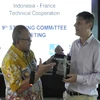Foreign officials and scholars spoke out against China’s ambition to occupy the entire East Sea via its groundless “nine-dash line” claim at a workshop in Buenos Aires, Argentina, on August 5.
Hosted by the Argentine Council for International Relations (CIRA), the event came after China’s placement of its oil rig Haiyang Shiyou – 981 in Vietnam’s continental shelf and exclusive economic zone in early May had sparked concerns in the world community.
China’s attempt to change the status quo is a violation of the 1982 United Nations Convention on the Law of the Sea (UNCLOS), and the Declaration on the Conduct of Parties in the East Sea that it signed with the Association of Southeast Asian Nations in 2002, said Vietnamese Ambassador Nguyen Dinh Thao.
He confirmed that Vietnam has adequate historical and legal evidence proving its sovereignty over Hoang Sa (Paracel) and Truong Sa (Spratly) archipelagos, and will hold on to its policy of settling the East Sea dispute by peaceful means in line with international law.
Philippine Ambassador Maria Amelita C.Aquino told participants that her country has filed a lawsuit against Beijing to the Permanent Court of Arbitration for violating the 1982 UNCLOS with its “nine-dot line” claim, and its illegal occupation of her country’s Scarborough shoal, which is named Huangyan island by China, in 2012.
The East Sea is known to sit on a huge oil and gas reserve and one of the world’s maritime lifelines, according to the Director of the CIRA’s Institute of International Security and Strategic Affairs Julio A. Hang, who called China’s unilateral placement of its oil rig in Vietnam’s exclusive economic zone a “serious” act.
CIRA was established in 1978 and growing into a prestigious think-tank in Argentina. It encourages national studies on global issues to serve the promotion of mutual understanding among nations.-VNA
Hosted by the Argentine Council for International Relations (CIRA), the event came after China’s placement of its oil rig Haiyang Shiyou – 981 in Vietnam’s continental shelf and exclusive economic zone in early May had sparked concerns in the world community.
China’s attempt to change the status quo is a violation of the 1982 United Nations Convention on the Law of the Sea (UNCLOS), and the Declaration on the Conduct of Parties in the East Sea that it signed with the Association of Southeast Asian Nations in 2002, said Vietnamese Ambassador Nguyen Dinh Thao.
He confirmed that Vietnam has adequate historical and legal evidence proving its sovereignty over Hoang Sa (Paracel) and Truong Sa (Spratly) archipelagos, and will hold on to its policy of settling the East Sea dispute by peaceful means in line with international law.
Philippine Ambassador Maria Amelita C.Aquino told participants that her country has filed a lawsuit against Beijing to the Permanent Court of Arbitration for violating the 1982 UNCLOS with its “nine-dot line” claim, and its illegal occupation of her country’s Scarborough shoal, which is named Huangyan island by China, in 2012.
The East Sea is known to sit on a huge oil and gas reserve and one of the world’s maritime lifelines, according to the Director of the CIRA’s Institute of International Security and Strategic Affairs Julio A. Hang, who called China’s unilateral placement of its oil rig in Vietnam’s exclusive economic zone a “serious” act.
CIRA was established in 1978 and growing into a prestigious think-tank in Argentina. It encourages national studies on global issues to serve the promotion of mutual understanding among nations.-VNA



















